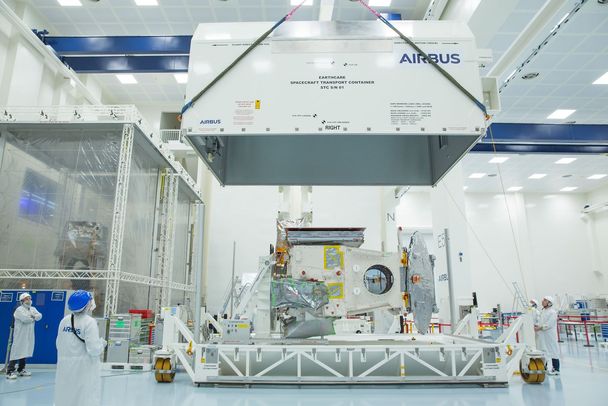Munich, March 9, 2024 – The Airbus-built EarthCARE (Global Cloud, Aerosol, and Radiation Explorer) spacecraft departed from Munich, Germany, and is currently on board the aircraft en route to its launch site in Vandenberg, California. EarthCARE is scheduled to launch on a Falcon 9 rocket in May.
EarthCARE is the most complex Earth Explorer mission in the European Space Agency’s (ESA) FutureEO program. This new satellite mission will quantify and reduce uncertainty about the role clouds and aerosols (tiny particles in the atmosphere) play in heating and cooling Earth’s atmosphere, contributing to a better understanding of climate change. The spacecraft was developed, built and tested with the participation of experts from 15 European countries, as well as Japan and Canada.
“As the world’s climate continues to change faster and faster, scientists are working harder than ever to enable better analysis,” said Mark Steckling, Head of Earth Observation, Science and Exploration at Airbus. “We need sophisticated space assets. EarthCARE can help fill the gap by:” Providing unprecedented measurements, it will help meteorologists and climatologists better understand how energy is transferred in the atmosphere. ”
EarthCARE, a joint venture between ESA and the Space Agency (JAXA), will investigate the role of clouds and aerosols in reflecting solar radiation into space and capturing infrared radiation emitted by the Earth’s surface.
EarthCARE climate satellite takes off from Munich, Germany, to a launch site in California, USA – Copyright Flughafen München
EarthCARE creates vertical profiles of natural and man-made aerosols, records the distribution of water droplets and ice crystals and how they are transported in clouds, and supports warming climate modeling and weather forecasting. Provides important input for improvement. Aerosols affect the life cycle of clouds and therefore indirectly contribute to how clouds emit radiation. Measuring aerosols allows us to better understand the Earth’s energy budget.
EarthCARE is supported by more than 200 research institutions around the world. Scientists can use the data to improve the accuracy of cloud-developed models, their behavior, composition, and interactions with aerosols.
Atmospheric lidar ATLID is one of four instruments on the EarthCARE satellite that provides vertical profiles of aerosols and thin clouds. ATLID is Europe’s second spaceborne ultraviolet lidar after the wind-sensing spacecraft Aeolus, making Airbus the world expert in spaceborne lidar.

In addition to ATLID, the satellite also includes a broadband radiometer developed by ESA through European industry, a multispectral imager developed by Airbus subsidiary SSTL, and a cloud profiling radar developed by JAXA . This unique combination of instruments allows scientists, for the first time, to directly assess the role of clouds and aerosols on the Earth’s radiation budget using one integrated satellite system, thereby reducing current uncertainties. Masu. EarthCARE will orbit the Earth in a sun-synchronous, 400 km polar orbit that crosses the equator in the early afternoon to optimize daylight conditions.
Airbus Defense and Space of Friedrichshafen (Germany) is the prime contractor for the development and manufacture of the two-ton satellite, while Airbus Defense and Space of Toulouse (France) supplies the atmospheric lidar ATLID.
/Open to the public. This material from the original organization/author may be of a contemporary nature and has been edited for clarity, style, and length. Mirage.News does not take any institutional stance or position, and all views, positions, and conclusions expressed herein are solely those of the authors. Read the full text here.

